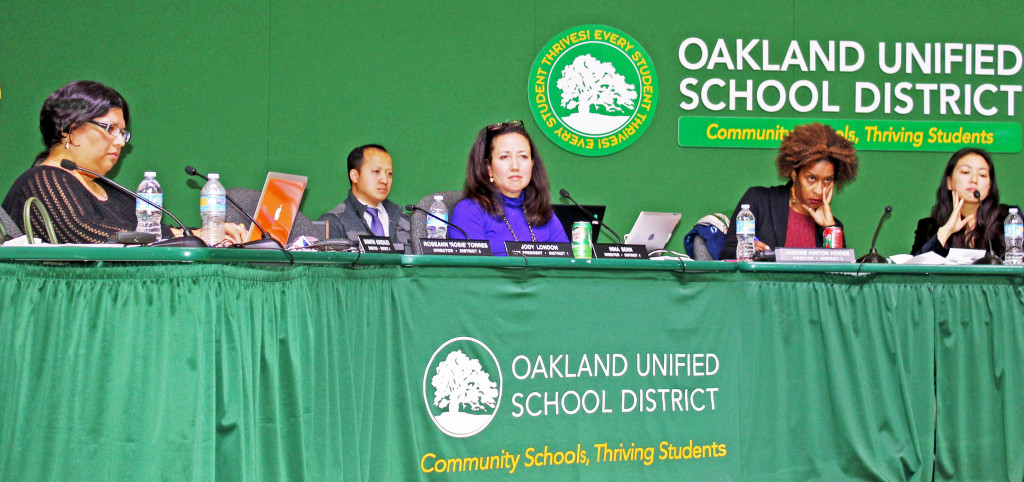School District Examines Causes of Financial Hardships
Sep 23, 2017
Supt. Wilson’s administration accused of trying to hide size of budget shortfall

By Ken Epstein
As the Oakland Unified School District (OUSD) closes its books for 2016-17, staff is pinpointing some of the financial missteps that led to the district’s current fragile economic condition, where even relatively small over-expenditures could result in state takeover.
The financial report, based on a close examination of the district’s income and expenditures, was presented by Interim Chief Financial Officer Gloria Gamblin and her staff at the school board meeting last week and at the board’s Budget and Finance Committee meeting this week.
One significant misstep last year was the failure of what is called “position control.”
Supt. Antwan Wilson’s administration created 75 positions, mostly in the central office, that were not accounted for in the budget and for which funds had not been allocated, said Katema Ballentine, OUSD’s financial officer of budget development
“That’s huge. I’ve never seen a budget number that large,” she said.
“The normal process is for a site or district leader (to) first confirm that there is money” before hiring someone, she said.
“That hasn’t happened as regularly as it should. People were just trying to please (the administration), so they skipped over processes.”
Ballentine said staff was still trying to figure out all of the positions that were created. The budget impact so far seems to be about $400,000, she said.
“We’ve been trying to pull that together,” she said.
Ballentine told board members that budget staff realized during the last months of Supt. Wilson’s administration that the district was facing a $30 million shortfall, but she and Senior Business Officer Vernon Hal were not allowed to tell the board.
“Vernon and I were not permitted,” she said.
Another issue was the misestimate of enrollment and failure to cut expenses when the error was discovered.
“In the fall (of last year), we discovered that our enrollment came in lower by 400 pupils, which was a loss of $3.9 million in revenue,” said Gamblin.
At that time, the administration made a decision to retain 36 of the 42 excess teachers, costing the district $3.2 million.
Overspending was severe in several specially funded programs. The district’s total contribution to special education was $56.4 million, Early Childhood Fund, $2.2 million; and Child Nutrition Fund, $3.2 million, for an overall total of $61.8 million.
Gamblin told board members they will receive monthly financial update reports and that they should know by November what additional cuts might be necessary.
She explained that in order to avoid being taken over by the state, the district is required to have sufficient reserves, a positive fund balance and positive cash balance.
“In the close of 16-17, we do have a positive fund balance,” she said.” We (had) a sufficient reserve of $3.4 million but not enough to meet our 2 percent reserve ($11 million) required by the state or the additional 1 percent that the board has by policy.”
“We also have a positive fund balance and a positive cash balance,” she said, indicating that meeting those three conditions means that OUSD has avoided state receivership.
“However, in the current year we have to really closely monitor our expenditures,” she said.
Oakland’s advisory state trustee, Christopher Leonard, warned the board that OUSD does not have the same leeway as other districts.
Because the district is making payments on $44 million it still owes on its $100 million state bailout loan, the state would be quicker to resort to receivership.
“The state is not going to lend Oakland any more money,” he said. “They are going to watch you very closely. If the board cannot make the decisions to reduce expenses … the state will come in and do it for you.”
OUSD faced a $37 million deficit in 2003 when it was taken over by the state and forced to take a $100 million state loan. Board committees, such as the Budget and Finance committee, were dissolved, and a state-appointed trustee unilaterally made all decisions on school closures and how to spend the money.
No audit of district finances was conducted during the six years of state control.
At press time, Mayor Muriel Bowser had not replied to questions from the Oakland Post about whether her office knew of OUSD’s budget shortfall when she hired Antwan Wilson as chancellor of Washington, D.C. schools.